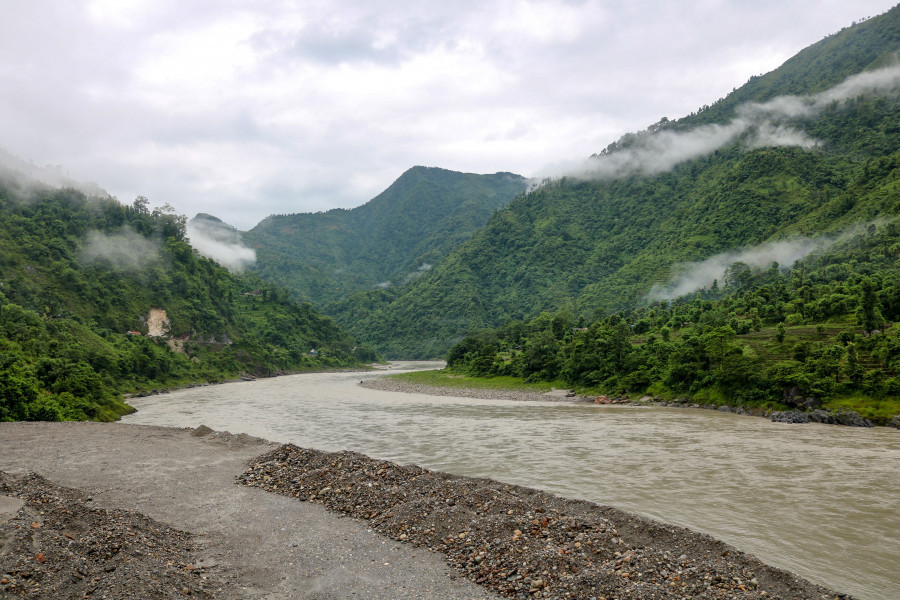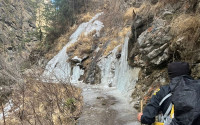National
Explosives shortage looms over Tanahun Hydropower Project
India’s reluctance to allow import of explosives may affect works at the 140MW project.
Prithvi Man Shrestha
The under-construction Tanahun Hydropower Project could soon face a shortage of explosives, which are needed for digging tunnels, after it failed to secure explosives from India.
Particularly, the Chinese contractor—Sinohydro Corporation Limited, which was awarded a contract for constructing the main tunnel, underground power house and installation of hydromechanical and electromechanical equipment, may have to halt its work owing to a shortage of explosives, a senior project official said. These tasks come under the second package of the project.
“The second package work will run out of explosives in two weeks,” said Kiran Kumar Shrestha, managing director of the Tanahun Hydropower Limited, the developer of the 140MW project. “It has been around nine months since a ‘No Objection Certificate’ was sought from the Indian Embassy for importing explosives to enable the Chinese company to carry out its work.”
He said as much as 150 tonnes of additional explosives could be required to complete the task under package 2.
In a statement on Wednesday, the Nepal Electricity Authority (NEA) said the Chinese contractor has so far completed digging 790 metres of the main tunnel, whose total length will be 1,456 metres.
It has completed digging earth for the underground powerhouse and the task of pouring concrete is ongoing and the work on installing penstock pipes and tailrace tunnels is also under way.
Sinohydro was awarded the contract on October 1, 2018 and the contractor had commenced the work in January 2019.
According to Shrestha, the Indian embassy had earlier provided a ‘No Objection Letter’ for importing explosives for package 1 work of the project.
This contract package was awarded to the joint venture of Song Da Corporation, Vietnam and Nepal’s Kalika Construction on 22 March 2021. The joint venture has been constructing a 140-metre high dam and two diversion tunnels for the project, according to the NEA.
“The Indian embassy granted a No Objection Letter for the import of explosives for package 1, but it is delaying the same for package 2,” said Shrestha. “We have been making efforts consistently to get approval from the Indian embassy.”
The responsibility of arranging explosives for the construction is the responsibility of the project developer, Tanahun Hydropower Company Limited.
The project’s completion deadline is June 2026, but if the shortage of explosives continues then the project may face delays, according to officials.
Nepali officials and private sector representatives say many construction projects involving Chinese contractors are facing shortage of explosives with India showing unwillingness to supply explosives to such projects.
A licensed supplier of explosives told the Post last month on condition of anonymity that the Indian embassy has been deliberately delaying ‘No Objection Letters’ for explosives intended for projects with Chinese elements.
“We have to apply at the Indian Embassy for ‘No Objection Letter’ by mentioning the projects for which the explosives are meant,” said the supplier. “The embassy has also not renewed NOCs associated with a number of projects with Chinese components.”
According to the supplier, hydropower projects including Upper Trishuli 1, Sanjen Khola, and Tanahun Hydropower Project; Hongshi Shivam Cements and Huaxin Cement Narayani—all with Chinese components—have been affected by India’s reluctance to supply explosives. The cement industry uses explosives for mining activities.
Officials and entrepreneurs involved in infrastructure projects said the Indian reluctance to supply explosives for projects involving Chinese contractors might have emanated from the Indian government’s policy of not buying electricity from projects involving Chinese elements.
For example, New Delhi is yet to give approval to the 456MW Upper Tamakoshi Hydropower Project for power export to India citing the involvement of a Chinese contractor in its civil works, according to Nepal Electricity Authority officials.
Even though the Nepal Army has been producing explosives commercially at its Sunchari Emulsion Plant established in Sunachari of Makawanpur district, it does not produce enough for the country’s all infrastructure projects.
“Our production is inadequate to meet all the demands. That’s why construction projects have been importing explosives," Nepal Army spokesperson Brigadier General Krishna Prasad Bhandari told the Post in late February.
During the 10th joint secretary-level Joint Working Group and the secretary-level Joint Steering Committee held in Jaipur, India on February 17-18, India had sought an ‘end user certificate’ from Nepal to provide explosives for the construction projects in the country. Officials said they believe such a proposal is intended at controlling the supply of explosives to projects funded by China or those involving Chinese contractors.




 17.15°C Kathmandu
17.15°C Kathmandu














